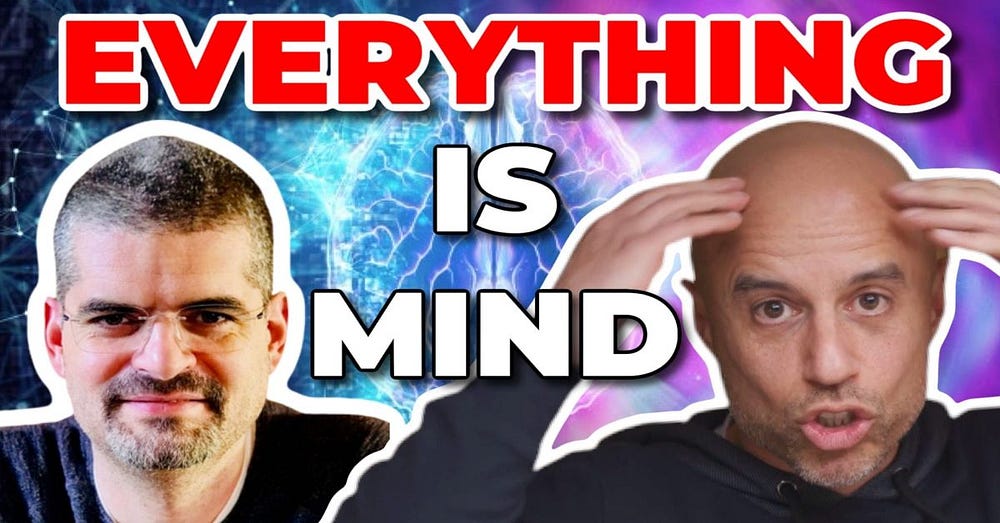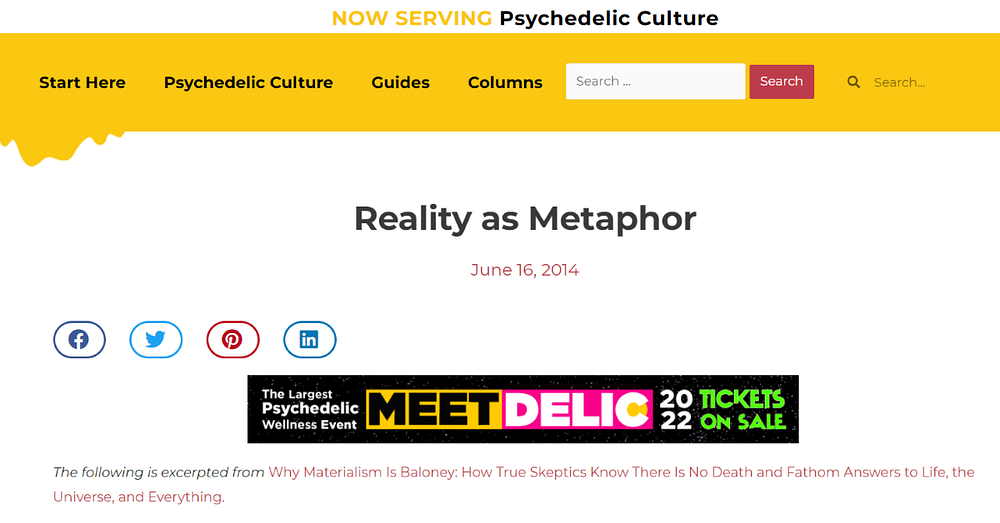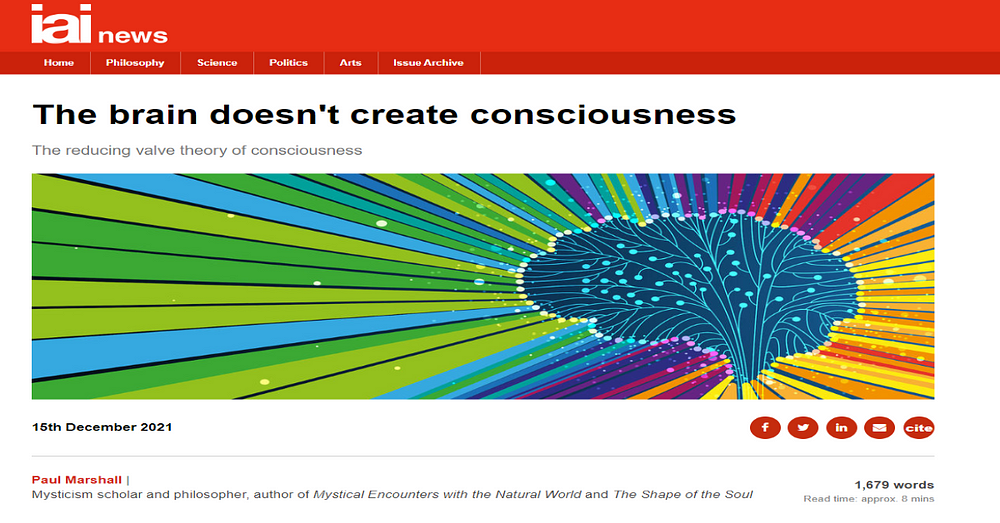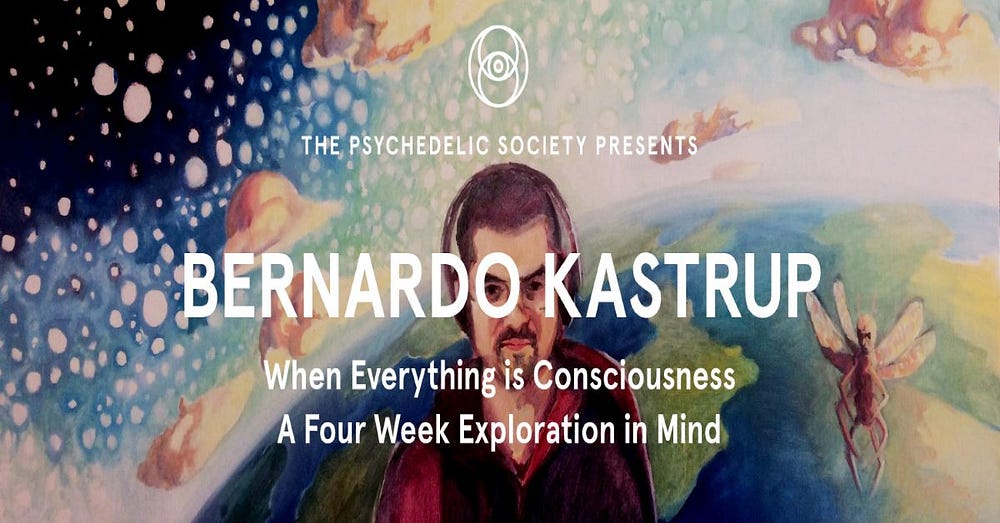Kastrup believes that “inanimate objects are ‘vibrations’ or ‘ripples’ of consciousness”. What does that mean?

“Metaphors are powerful tools to paint subtle, complex and nuanced mental landscapes that are difficult or even impossible to communicate literally.”
— — Bernardo Kastrup (see source here)
“[Analytic idealism] is a formulation that will appeal to intellectually hard-nosed, left-brained, science-oriented people [].”
— — Bernardo Kastrup (source here)
Reality is a Metaphor: Ripples and Vibrations

“Inanimate objects are simply ‘vibrations’ or ‘ripples’ of consciousness and, ultimately, nothing but consciousness itself [].”
— — Bernardo Kastrup
[See ‘Reality as Metaphor’; which is an extract from Bernardo Kastrup’s book Why Materialism Is Baloney.]
There are indeed fundamental properties and/or entities in physics which are said to “vibrate” and “ripple” (see here and here). However, are Bernardo Kastrup’s own words “vibrations” and “ripples” purely metaphors which can’t really be unpacked because they contain very little (if any) scientific (or even philosophical) content? And even if the words “ripples” and “vibrations” aren’t metaphors, could Kastrup go into any detail about them — as physicists most certainly do when discussing their own ripples or vibrations?
In any case, this means that Kastrup’s version of consciousness (or Cosmic Consciousness) isn’t so fundamental that it can’t vibrate and ripple. Yet usually the things which vibrate and ripple are in some way physical in nature…
Yet, as ever, Kastrup can dodge that particular bullet. And he often does so by simply stating that the physical things which vibrate and ripple are instantiations of consciousness too!
The Brain as a Filter?

Many (or even all) Cosmic Idealists argue that the human brain is a (to use Kastrup’s own word) “filter” (see here). That is, they argue that the brain is something that consciousness (or Cosmic Consciousness) — which they take to already exists — is filtered through. Thus the biological brain neither produces consciousness nor does consciousness have any necessary link to it. (Except for the extremely strong link that every human case of consciousness — that is, tens of billions of human cases throughout history — has been tied to the biological and physical brain.)…
But we must slow down here!
According to Kastrup himself, “the brain is [also] an image of consciousness”. Thus Kastrup’s warns us about the “filter theory” of consciousness (i.e., despite using the term himself and thinking it a decent “metaphor”). That is, if “all is consciousness”, then how can the brain — which, by definition, must also be consciousness — be seen as a filter of consciousness?
The following passage is Kastrup himself putting his position:
“The idea that the brain does not generate consciousness, but instead limits and filters it down, seems to require dualism and contradict idealism. After all, if all reality exists in consciousness, how can the brain — which is a part of reality — filter down that which gives it its very existence? A water filter is not made of water; a coffee filter is not made of coffee; how can a consciousness filter be made of consciousness? It sounds like a self-referential contradiction.”
[Kastrup also makes his position clear in this YouTube video response to Dr Steve Taylor, who is a “panspiritist”. It begins at 35 minutes and 24 seconds.]
So does Kastrup have his cake and eat it too?
Kastrup’s own Cosmic Idealism, then, is more (as it were) total than some other takes on this ism.
Here is a similar problem; as included in a passage from Gerald R. Baron (see here):
“In these versions consciousness is a universal substrate underlying all reality including the physical world. Some hold that what appears to us as solid matter is actually an illusion and only experience is real (idealism) [].”
Yes; if everything is consciousness, then how can consciousness also be a “substrate”? That is, if consciousness is a substrate, then what is it a substrate of? Is consciousness a substrate for something that isn’t itself consciousness? (That’s problematic for Kastrup’s Cosmic Idealism.) So is consciousness a substrate for… well, consciousness? (Does that even make sense?)
Indeed Kastrup himself uses the word “substrate” here:
“[T]he substrate of mind cannot be measured, detected, or analyzed like some kind of stuff, because it is that which measures, detects, and analyzes in the first place.”
[This passage will be tackled in the next section.]
In any case, various Cosmic Idealists continue to reason as follows.
When death arrives, then there is another filter which is Cosmic Consciousness. This is something which human persons can (as it were) use or tap into. More accurately (i.e., in the theology of Cosmic Idealism), the consciousnesses of human persons “return to Cosmic Consciousness”. So, in that literal (or strict) sense, Cosmic Consciousness can’t be seen as a filter if everything is consciousness. (Again, this is similar to Kastrup’s problem with the brain being seen as a filter.)
Here is another writer adding some details to this brain-as-filter position. Manu Herrán states the following:
“A possible explanation here is that our minds are like radio receivers, capable to connect to some emitting ‘station’.”
The passage above has it that it’s not even that our brains are “like radio receivers” — our “minds” are. Yet some Cosmic Idealists argue that an individually embodied brain (in a particular set of physical environments) is like a temporary — physical? — “conduit” into which Cosmic Consciousness (as it were) seeps for a very short duration of time — that is, for a specific person’s lifetime.
Herrán continues:
“The mind, as the radio-receiver, does not generate something new (experiences), but connects to them. [] We can call this the opposite of ‘emergentism’, that is, ‘immersionism’.”
According to the passage above, your experience of, say, a dog having a shit (or a poppy waving in a breezy summer field) is actually your mind connecting to that very same experience as it exists outside of the your brain and the spatiotemporal slice that is the dog having a shit (or a poppy waving in a breezy field). That is, your mind (as “radio-receiver”) is delivered the experiential input (from Cosmic Consciousness) of a dog having a shit (or a poppy waving in a breezy field). So the experience of a dog shitting (or a poppy waving) is what happens when we “immerse” with Cosmic Consciousness”.
We also have Gerald R. Baron (again) on the same theme here (though he’s not necessarily endorsing these positions):
“The filter model [] describes the role of the brain as a filter or reducing valve that serves to limit and select experiences or thoughts from the source or sources and the perhaps infinity of options available to it. In this case, the brain does not produce the thought as much as receive it, process it and act on it.”
Here again, the brain “select[s]” the “experience[]” of a dog having a shit (or of a poppy waving in a breezy summer meadow) “from the source or sources and the perhaps infinity of options available to it”. Thus the “brain does not produce” the experience of a dog having a shit (or poppy waving) “as much as receive[s] it, process[es] it and act[s] on it”. Of course, on an everyday or non-idealist picture, the brain alone isn’t seen to be solely responsible for the experience of a dog shitting (or of a poppy waving). Something has to occur outside the mind to bring about these experiences. Still, the experience is indeed in the mind — and this acknowledgement provides grist to the idealist’s mill. On the other hand and on this Cosmic Idealist picture, there’s literally nothing outside the individual mind. Alternatively, there’s literally nothing outside Cosmic Consciousness — “the source” of the experience of a dog shitting (or of a poppy waving).
But what the hell does all that mean?
Do any Cosmic Idealists actually go into any detail on all this or is the experience of a dog having a shit (or of a poppy waving) “fundamental”?
So why quote the word “fundamental” here?
Is Consciousness Fundamental?

The following passage is Bernardo Kastrup discussing what he calls the “substrate of mind”. He writes:
“[T]he substrate of mind cannot be measured, detected, or analyzed like some kind of stuff, because it is that which measures, detects, and analyzes in the first place.”
In another place, his position is expressed in much simpler terms:
“The medium of mind itself cannot be known directly, for it is the knower.”
And here’s another similar passage from Kastrup:
“Mind is an irreducible aspect of nature which itself cannot be explained in terms of anything else.”
Basically, then, Kastrup is arguing that because consciousness is (so) fundamental, then it can’t be “measured, detected, or analyzed”. That’s because if consciousness could be measured, detected and analyzed, then it wouldn’t actually be fundamental at all!
Yet all this is very easy and somewhat cheap.
That’s primarily because almost anything can be deemed to be fundamental — via stipulation. Thus many people may deem an angel to be fundamental. (“So don’t ask me any questions about what it is!”) The experiences of the “afterlife” can be deemed to be fundamental too.
So it can be supposed that if consciousness is truly fundamental , then Kastrup doesn’t need to explain such categorical statements as the following:
“Inanimate objects are simply ‘vibrations’ or ‘ripples’ of consciousness and, ultimately, nothing but consciousness itself [].”
[Philosophers such as David Chalmers and Philip Goff also believe that consciousness is fundamental; though in very different ways to Kastrup — see here and here.]
Kastrup doesn’t need to explain the passage above because that which is fundamental (as already stated) can’t be further explained. Alternatively, consciousness can’t be (in Kastrup’s own words) “measured, detected, or analyzed” either.
Yet if some x were believed to be truly fundamental, then could it also be said to (getting back to an earlier theme) vibrate and ripple?
Kastrup may well admit that these words are simply metaphors. Thus, again, he has his cake and eats it too. On the other hand, mere soulless mortals like me — who’ve been corrupted by “materialist” false consciousness — may not get the deep, complex and profound messages which Kastrup is humbly offering the world (if in the guise of poetic and emotionally-appealing metaphors).
Still, the basic argument must be (again, under the metaphors and technical terms from science and philosophy) that because consciousness is fundamental, then nothing can be said about it.
All this means that Kastrup can make the following statement without fear of embarrassment:
“Idealism proposes that all reality is in mind and, as such, one can say metaphorically that everything is ‘made of’ the substrate of mind.”
So what is the non-metaphorical explanation of all this?
As stated: there isn’t one!
Again, that’s because mind (or consciousness) is fundamental.
Thus all we really have left are Kastrup’s metaphors (all suitably fused with copious technical terms from science, philosophy and Carl Jung).
Indeed Kastrup even rationalises his (over)use of metaphors in the following way (as already quoted at the top):
“Metaphors are powerful tools to paint subtle, complex and nuanced mental landscapes that are difficult or even impossible to communicate literally.”
How does Kastrup know anything at all (or, if not know, then how can he say anything at all) about this these “subtle, complex and nuanced mental landscapes” if they’re also “difficult or even impossible to communicate literally”? (Not that we can be sure what Kastrup means by the words “mental landscapes”.) How does Kastrup even know that these mental landscapes are subtle, complex and nuanced at the very same time as claiming that they’re difficult or even impossible to communicate literally?
So what are these mental landscapes which can’t be communicated literally?
Are they simply intuited? Are they only (as it were) known through the soul or through individual consciousness? (To Kastrup, the individual soul may well be the same as individual consciousness — at least that “egoless” aspect of the mind which is shared with Cosmic Consciousness.)
Admittedly, Kastrup is talking about “mental landscapes” here. Then again, in Kastrup’s Cosmic Idealism the entire Cosmos is mental. Thus the entire Cosmos — and perhaps even the actual position of Cosmic Idealism itself— must also be difficult or even impossible to communicate literally. Hence Kastrup’s many metaphors.
So how neat, tidy and convenient is all that?
And perhaps these speculations are entirely a figment of Kastrup’s ego.
Conclusion

Does all the above mean that Bernardo Kastrup and his fellow Cosmic Idealists can take refuge in such metaphors at the very same time as finding them very emotionally and psychologically appealing?
Finally, just when one thought that the word “consciousness” was already too vague or protean to help within any genuine debate between people with rival views (a view which dates back to the late-19th century and now is often deemed to be a “positivist” position), then along comes Bernardo Kastrup and other Cosmic Idealists to make the situation even worse than it already was.
******************************************************************
(*) See my essays ‘Bernardo Kastrup’s Spiritual Take on Psychedelic Experiences and Cosmic Consciousness’, ‘The Idealist Philosopher Bernardo Kastrup vs. Materialism’ and ‘Bernardo Kastrup (the Well-Known Cosmic Idealist) and His Afterlife’.










No comments:
Post a Comment